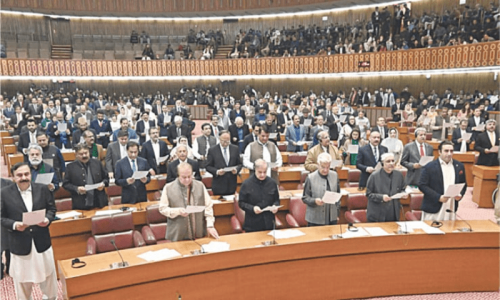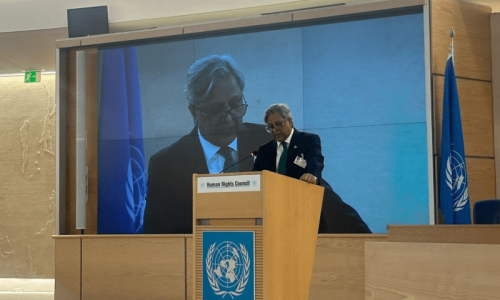ISLAMABAD, Sept 15: Pakistan formally protested to India on Monday over the reduction in Chenab River flows and sought an emergency meeting of the Permanent Indus Commission for explanation of the violation of the 1960 treaty on water sharing.
The reduction has caused substantial losses to standing Kharif crops in most areas downstream of the Head Marala, in Punjab.
The irrigation needs of the area are being currently met by increased releases from the Mangla reservoir in order to save rice and sugarcane crops.
The water shortfall is also expected to affect the coming Rabi crops because of a depletion in resources at Mangla.
Over the past two months, Pakistan has protested to India at least six times over violation of the Indus Waters Treaty, Permanent Indus Commissioner Syed Jamaat Ali Shah told Dawn. He said the Indian High Commissioner in Islamabad had been called by the Foreign Office on Sept 5 to convey Pakistan’s concern over the river situation. Islamabad asked New Delhi to allow inspection of Baglihar dam in Indian-occupied Kashmir.
He said Pakistan had sought compensation from India for its agricultural losses, adding that the Punjab government had been asked to assess the damage to crops.
According to one estimate, the Indus commissioner said, India had deprived Pakistan of about 200,000 acre-feet of water over the past few weeks.
At the heart of the problem was the controversial Baglihar dam, which led the two countries to seek World Bank arbitration. The WB helped address some of the objections Pakistan raised over the design of the project, but its post-completion ramifications still continue to haunt Pakistan’s irrigation system.
Mr Shah said after the commissioning of the project, India required initial filling of the dam.
The two sides had agreed to a schedule for the purpose.
The agreement required that filling should take place between June 21 and Aug 31 with prior consent of Pakistan and subject to a condition that river flows should not drop below 55,000 cusec inside Pakistan at any time.
He said Pakistan had been asking the Indian side to share the schedule for dam filling and allow site inspection of Baglihar dam, but in vain.
On Aug 7, New Delhi informed Islamabad through an email that it would be filling Baglihar dam between Aug 10 and 31, assuring that the river flows would not fall below the limit.
He said as soon as Pakistan noticed a reduction in river flows between Aug 15 and 19, “we wrote another letter seeking the filling schedule”. The letter remained unheeded and flows went below the minimum limit, prompting Islamabad to take up the matter with New Delhi. He said the situation improved for two days when the Indian commissioner visited Pakistan for a meeting on Neelum-Jhelum.
On the return of the Indian delegation, Islamabad again took up the issue, telling New Delhi that it was a serious violation of bilateral arrangements. He said Pakistan had been losing up to 15,000 cusec of water every day because of India’s action. He, however, clarified that although the reduction was substantial, the flow in Chenab had never fallen to the zero level.
He said Pakistan’s Indus Commission reminded its Indian counterpart in the first week of this month that it should stop interfering with Pakistani waters, fully restore river flows and inform Pakistan of the rectification.
India had also been asked to arrange an emergency meeting of the permanent Indus commission and allow site inspection of the Baglihar dam.
“India is dilly-dallying on these two counts, which is a violation of the (Indus) treaty.” Jamaat Ali Shah said the Foreign Office, too, had lodged a protest with India over violation of the 1960 agreement.
“Instead of responding to the protest, Delhi put the Baglihar hydropower project on trial on Sept 5. This constitutes yet another violation of the Indus treaty,” Jamaat Shah said.

















































